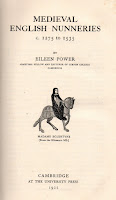I recently bought a fine copy of Eileen Power's Medieval People in a first printing Penguin, in its dust wrapper. Published in Pelican Books in 1937 as number A19, it had a very heart-warming quotation from Charles Lamb on the title page: 'I counsel thee, shut not thy heart nor thy library'. I also have a copy of the first hardback edition, published by Methuen & Co. in 1924 (alas, without a dust wrapper).
There are six chapters, each concentrating on various aspects of social life in the Middle Ages and various classes of historical material. Power takes us on a journey through life on a medieval estate (Bodo the French peasant); Venetian trade with the East (Marco Polo and family); English monastic life (Chaucer's Madame Eglentyne); the English wool trade (Thomas Betson); and the cloth industry in East Anglia (Thomas Paycocke). I found all the stories fascinating, learning much and admiring Power's meticulous research and skilful descriptions. I had already bought and read her excellent series of Ford Lectures, delivered at Oxford University in 1939, only a year before her early death, aged just fifty-one.
Moreover, in 2005, (I can't believe it is so long ago) I purchased Maxine Berg's biography of Power.
O .U.P. - 1955 reprint Maxine Berg - 1996
Eileen Power, born in 1889, studied at Girton College, Cambridge, and took a First in both parts of the historical tripos. After further study at the University of Paris and the London School of Economics, she became directory of studies in History at Girton (1913-1921). In 1921, she was appointed lecturer in economic history at the LSE, becoming Reader in 1924 and Professor in 1931. She also became involved in Suffrage politics, increasingly researching women's medieval history as well as world history. Her Medieval People was a social history written to spread a message of internationalism. She associated trade and merchants with international connection and peace. She co-wrote children's history books with her sister Rhoda and together they gave BBC schools history broadcasts. I found reading about her life and work that I increasingly admired both - a magnetic and attractive personality ensured her lectures were extremely popular and I quite understood Maxine's Berg's feeling of irritation (even anger?) that she was wrongly overshadowed by the male historians of the time. I did note, however, when recently flicking through G. M. Trevelyan's English Social History, that he dedicated the book to Power: To the memory of Eileen Power economic and social historian. Power was a feminist, but never an aggressive one and was unfairly sidelined for many years after her death, being dismissed by one historian as a writer of a cosy sort of social history, short on the analytical and strong on the picturesque. Well, others, such as Trevelyan himself, have been accused of this - and of writing 'narrative history'. Give me this type of history - literary, readable and, above all, inspiring, rather than the boring analytical, chart/graph obsessed genre, with footnotes/endnotes taking up more space than the main text. Ugh!
Eileen Power did not live long enough to publish weighty tomes (Power's oeuvre, for all her hard work, was woefully thin on major monographs) - but she did leave behind one magnum opus: Medieval English Nunneries.
Cambridge University Press - 1922
She set out to give a general picture of English nunnery life during a definite period, the three centuries before the Dissolution. She relied heavily on Bishops' Visitations, which, inevitably, led to a charge that the picture drawn militated against the nuns, where blame rather than praise was usual. Rather like OFSTED and schools these days. At least, it eschewed the hagiography of Abbot Gasquet and other Roman Catholic apologists. She also used other sources, such as the Archiepiscopal Registers, individual nunnery Account Rolls, Inventories and Cartularies, Wills and Letters. She, rightly, paid tribute to the work and support of A. Hamilton Thompson and G. G. Coulton. Her book was in the series Cambridge Studies in Medieval Life and Thought, for which Coulton was the General Editor. I am a great fan of both men and their writings, particularly Coulton, who did a hatchet job on Gasquet and had a trenchant turn of phrase. I must blog on him one day, as I have several of his books.
However, back to Power's work. I pillaged it for my own little booklet on Grace Dieu Priory (2006; 2nd ed. 2016) and my longer Introduction in Grace Dieu Priory Leicestershire 1414-1418: The Draft Account Book of the Treasuresses (2013) and found it compelling reading. With chapters on the Abbesses and Prioresses and the Novices; financial problems; education, both for the nuns themselves and for children of both sexes; and, especially interesting for a voyeur like me, the accounts of nuns escaping the bounds of the convent - Fish out of Water - and their sexual peccadillos - The Old Daunce. Also of great value is her chapter on The Nun in Medieval Literature: using Ancren Riwle and Myroure of Oure Ladye (Syon Nunnery), as well as Langland, Gower and Chaucer. Power ended her survey, aptly enough, with a long quotation from Chaucer on Madame Eglentyne - a masterpiece of humorous observation, sympathetic without being idealised, gently sarcastic without being bitter.
Eileen Power's early death was a great loss to the History profession. She should be placed in the Pantheon with the other great practitioners of her time.






No comments:
Post a Comment